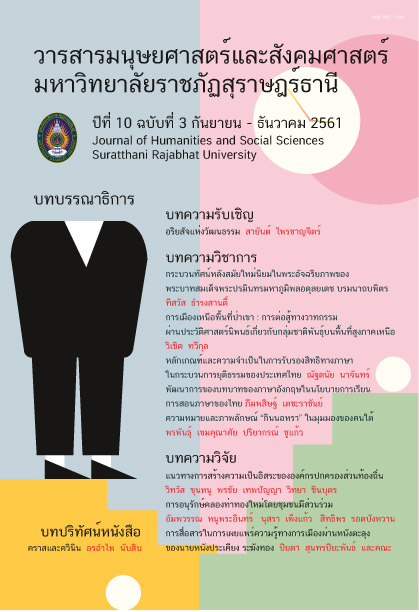The Communication f Political Information via Shadow Puppets of Shadow Puppet Master Prakieng Rakangtong
Main Article Content
Abstract
This research aims to study: 1) characteristics of communication; 2) content and modes of presentation; 3) problems with the communication; 4) shadow plays. This research is a qualitative research study. Data was analyzed from in-depth interviews, group discussions, and observation. The main contributors were Mr. Prakieng Rakangtong, 24 audience members, and academic people who work with shadow puppets, famous shadow puppet performers, and 6 academic people working in political communication.
The findings were as follows. 1) Characteristics of communication were; respect Buddhism, and democracy, believe in the power of the people, considered the audience, chose suitable content and environment, used narrative to present the story as a character interaction or use debating techniques, political content blends with fun, have self-interest in politics, learning to follow the news and exchange knowledge with local people. 2) Content and modes of presentation fit with current political events focused on administrative policies that affected the people’s wellbeing, administrative behavior, social issues and role of population. The presentation format uses 10 formats. Modes of presentation included mocking and satirizing and were mainly about situations in the country. 3) Problems with the communication were lack of audience political knowledge and experience similar to the performer. 4) Audience’s demand about national security and defense policy, economic problems, generating income, reform in politics and government by informative presentation that combines fun through puppets. 5) Approaches for developing communication were; a politically knowledgeable and idealistic puppet master realized about the value of democracy, considered audiences’ knowledge, thinking, or beliefs, political values, and political cultures of audience in the community. Presentation methods should be updated for new generation viewers including poetry and dialogue singing techniques and modern new characters and modern music.
Keywords: Communication, Dissemination of political information, Shadow puppet, Prakieng Rakangtong
Article Details
All published manuscripts have been verified by peer-peer professors in the fields of humanities and social sciences. Reprinting of the article must be authorized by the editorial staff.
References
Press.
Boontip, K., (1997). An analysis of the substance from the shadow clown. Master of Communication Arts - Not
Chaikaew, S., (2005). The political role of local media. (In progress, not published). Kasetsart University, Bangkok.
Charus, C., (2005). Local wisdom appeared in the shadow play. Faculty of
Humanities and Social Sciences, 1 (1), 1-25.
Damsri, W., (2005). View Profile to study the culture of the community. Nakhon Si Thammarat Special Issue Month Ten, 1 (1), 48.
John Hasling. (1998). Audience Message Speaker. (6th edition). New York: Foothill College.
Knabkeaw, K., (1998). The study of villagers' folk wisdom in shadow play. Faculty of Humanities and Social Sciences Rajabhat Institute Songkhla.
Knabkeaw, K., (2005). Analysis wisdom to use Southern Thai words, Thai idioms appear in the shadow play of Chin Aonmut. Songkhla: Faculty of Humanities and Social Sciences Songkhla Rajabhat University.
Nakkaray, P., (2005). Guidelines for promotion of shadow play for teenagers in Songkhla Province. (Unpublished Master Thesis). Thammasat University, Bangkok
Narongrat, R., (2005). Media with the modification of folk media shadow play. (Unpublished Master of Communication Arts). Chulalongkorn University, Bangkok.
Posita, C., (2009). Science and art of qualitative research. Bangkok: Amarin Printing & Publishing.
Sumtawanich. (1977). Politics and Administration. Faculty of Political
Science, Chulalongkorn University.
Suppakarn, C., (1997). Describing identity in a virtual community. (Master of Communication Arts Not published). Chulalongkorn University, Bangkok.
Theeravin, L., (2003). The evolution of Thai politics. Bangkok: Thammasat University Press.
Wikipedia. (n.d.). Sovereignty. Retrieved on October 13, 2016 from http://en.wikipedia.org/wiki/vereignty.
Yootong, C., (2009). What will we do?. Thaksin Education Institute, Thaksin University.
Interviews
Asawin Netpokaew (Interviewee) Piyata Soontornpiyaphan (Interviewer). at
the School of Communication Arts National Institute of
Development Administration, Bangkok. On 6th October 2017.
Boontham Therdkiatchart. (Interviewee) Piyata Soontornpiyaphan
(Interviewer). at the library of Nakhon Si Thammarat Rajabhat
University, Nakhonsithammarat. On 10th October 2017.
Jaroon Yootong (Interviewee) Piyata Soontornpiyaphan (Interviewer). at the
Institute for Southern Thai Studies Thaksin University, Songkha. On
27th September 2017.
Khajorn Faites. (Interviewee) Piyata Soontornpiyaphan (Interviewer). at the
School of Communication Arts in Kasetsart University, Bangkok. On
1st September 2017.
Kieng Rakangtong (Interviewee) Piyata Soontornpiyaphan (Interviewer). at the
library of Suratthani Rajabhat University, Suratthani. On 15th March
2017.
Mitree Juntra. (Interviewee) Piyata Soontornpiyaphan (Interviewer). at the
Graduate School of Nakhon Si Thammarat Rajabhat University,
Nakhonsithammarat. On 25th September 2017.
Pittaya Bussararut. (Interviewee) Piyata Soontornpiyaphan (Interviewer). at
the library of Nakhonsithammarat, Nakhonsithammarat. On 3rd
September 2017.


